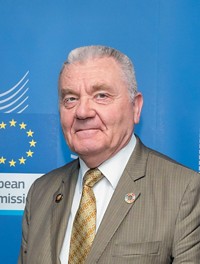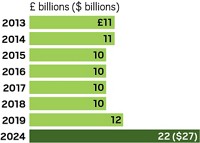Advertisement
Grab your lab coat. Let's get started
Welcome!
Welcome!
Create an account below to get 6 C&EN articles per month, receive newsletters and more - all free.
It seems this is your first time logging in online. Please enter the following information to continue.
As an ACS member you automatically get access to this site. All we need is few more details to create your reading experience.
Not you? Sign in with a different account.
Not you? Sign in with a different account.
ERROR 1
ERROR 1
ERROR 2
ERROR 2
ERROR 2
ERROR 2
ERROR 2
Password and Confirm password must match.
If you have an ACS member number, please enter it here so we can link this account to your membership. (optional)
ERROR 2
ACS values your privacy. By submitting your information, you are gaining access to C&EN and subscribing to our weekly newsletter. We use the information you provide to make your reading experience better, and we will never sell your data to third party members.
Environment
Sweeping Eastward
As the global economic downturn blankets the world, some Eastern European scientists feel the heat
by Sarah Everts
March 16, 2009
| A version of this story appeared in
Volume 87, Issue 11

TO MANY people in Latvia, a small country bordering the Baltic Sea, the economic crisis spreading around the world must feel like a knockout punch. Less than a year ago, Latvia's booming economy was evident in the bustling streets and cafés of its capital, Riga, and the throngs of tourists visiting the city's quaint medieval old town. By winter, inflated housing prices, slack regulators, and too much borrowing, coupled with unsustainable government spending, were taking their toll. By the last quarter of 2008, the bubble had burst, leaving Latvia's economy a painful 11% smaller than the year before.
As media reports abound, asking whether Latvia's economic woes might forecast future distress in other Eastern European states, scientists in the region are keeping a watchful eye, with some level of angst.
In January, the Latvian government instituted a variety of budget cuts, including an approximate 40% reduction of funding for research and education that also cuts the salaries of university professors, says Peteris Trapencieris, a chemist at the Latvian Institute of Organic Synthesis, in Riga. At the time, the government projected it would need to cut an additional 20% from science budgets by May. But in February, the Latvian government collapsed after public outrage that included violent demonstrations.
"I am worried life is going back to what it was in the early '90s," when the country was struggling to reestablish itself economically after 40 years of Soviet occupation, Trapencieris says. "I don't know how much time it will take to get back to where we were [economically] last year."
While President Barack Obama announced a U.S. stimulus package that includes funding for research in high-tech areas such as energy, governments in Eastern Europe announced cuts in science, research, or education budgets, although none as drastic as Latvia's.
For example, the Polish Ministry of Science & Higher Education received a more than $200 million, or 6%, cut to the 2009 budget, which the government aims to compensate for with EU funds. Meanwhile, Lithuania's government recently announced a 10% cut across the entire government budget.
Companies worldwide are also tightening their belts, and Eastern European researchers who depend on outsourcing work are feeling the squeeze.
"My contract research work has decreased drastically," Trapencieris says. "Two of my projects, one from Germany and another from Sweden, were cut completely." Trapencieris says he will have to rely on some remaining money from European Union grants, but many colleagues in his country do not have such options.
IN HUNGARY, István T. Horváth, a chemist at Eötvös Loránd University, in Budapest, also lost a contract research project due to the crisis. "Everybody is under tremendous economic pressure," HorvÁth says. "Of course companies are going to try to protect the guys inside, which means outsourcing gets cut." Even though HorvÁth still has other contracts to keep his research afloat for the time being, he's thinking about leaving the country for a position where prospects for science funding are more optimistic, he says.
"Brain drain has been a serious concern" since the collapse of the Soviet Union," says Gábor B. Makara, president of the Hungarian Scientific Research Fund. Now he's more concerned than ever. "Repatriating brain power from abroad is a priority too," Makara adds, but during a recent trip to the U.S., he heard many Hungarian scientists abroad tell him they feel that "this is not the moment to come home."
Earlier this month, the EU turned down Hungarian Prime Minister Ferenc Gyurcsány's request for a more than $200 billion bailout of Eastern European economies, despite his warning that a new economic "Iron Curtain" could separate Europe again.
Not all Eastern European countries are suffering economically as much as Latvia and Hungary: Even some of the Eastern European nations that would have benefited from Gyurcsány's bid had it been successful—including Poland, the Czech Republic, Slovenia, Slovakia, and Estonia—were not in favor of the bailout.
Those countries' economies are handling the economic storm better than their neighbors. But after the bailout bid failed, many Eastern European currencies reeled.
Weakening currencies mean "a loss of purchasing power, which is difficult for laboratories that rely on the world market to buy reagents," Makara says. According to Bloomberg News, the Polish zloty is currently the worst performing emerging-market currency, having dropped 30% against the euro in the past six months; the Hungarian forint dropped 22% during the same period.
Karol Grela, a professor at the Institute of Organic Chemistry, in Warsaw, says despite the overall downturn in the economy, his diversified mix of Polish grants in zloty, EU grants in euros, and contract research in a variety of currencies is keeping him positive. But he concedes that his optimism "is probably an exception."
Others see a long road ahead. "The economic crisis is just coming to Slovakia with all consequences," says Andrej Bohá??, an organic chemistry professor at Comenius University, in Bratislava, Slovakia. Although the Slovak government has not yet announced any budget cuts, he and his colleagues worry that the country's main granting agency will stall on new calls for proposals.
As for researchers in Latvia, "We are looking to find resources to help our research stay alive," Trapencieris says. "Our government is not in a position to help science and education now."





Join the conversation
Contact the reporter
Submit a Letter to the Editor for publication
Engage with us on Twitter